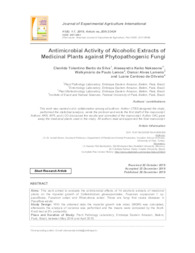Antimicrobial activity of alcoholic extracts of medicinal plants against Phytopathogenic fungi.
Antimicrobial activity of alcoholic extracts of medicinal plants against Phytopathogenic fungi.
Autoria: SILVA, C. T. B. da; NAKASONE, A. K.; LEMOS, W. de P.; LAMEIRA, O. A.; OLIVEIRA, L. C. de
Resumo: Aims: This work aimed to evaluate the antimicrobial effects of 14 alcoholic extracts of medicinal plants on the mycelial growth of Colletotrichum gloeosporioides, Fusarium oxysporum f. sp. passiflorae, Fusarium solani and Rhizoctonia solani. Those are fungi that cause diseases in Passiflora edulis. Study Design: With the obtained data the mycelial growth rate index (MGRI) was calculated, afterwards the analysis of variance was performed and the means were compared by the Scott-Knott test at 5% probability. Place and Duration of Study: Plant Pathology Laboratory, Embrapa Eastern Amazon, Belém, Pará, Brazil, between May 2014 and April 2015. Methodology: The extracts were prepared with 1.0 g of powdered plant material and 10 mL of commercial ethyl alcohol 92.8º (0.1 g mL-1) under constant agitation in an orbital shaker at 200 rpm for 20 minutes. They were then kept in the refrigerator for 24 hours at rest. The extracts were centrifuged and filtered on Millipore membranes with 0.22 µm porosity. The tests with the phytopathogenic fungi were carried out in vitro with the alcoholic extracts at 1% concentration. The experimental design was completely randomized with 15 treatments and 5 replicates. Results: All the extracts reduced the growth of the fungi C. gloeosporioides. The extracts the Eucalyptus angulosa, Lippia alba, Zingiber officinale, Cymbopagon citratus, Azadirachta indica, Plectranthus barbathus, Hibiscus sabdariffa, Aloe vera, Pedilanthus tithymaloides, Mansoa alliacea and Chenopodium ambrosioides reduced the mycelial growth of F. oxysporum f. sp. passiflorae. Only the extract of E. angulosa presented reduction in the growth of F. solani. Meanwhile the extracts of E. angulosa, Z. officinale, L. alba, M. alliacea and P. barbathus reduced the mycelial growth of R. solani. Conclusion: All extracts presented antimicrobial potential, being that the extract of E. angulosa reduced the mycelial growth of all the evaluated fungi.
Ano de publicação: 2019
Tipo de publicação: Artigo de periódico
Unidade: Embrapa Amazônia Oriental
Palavras-chave: Atividade antifúngica, Controle alternativo, Fungo, Fungos fitopatogênicos, Planta Medicinal
Observações
1 - Por padrão são exibidas publicações dos últimos 20 anos. Para encontrar publicações mais antigas, configure o filtro ano de publicação, colocando o ano a partir do qual você deseja encontrar publicações. O filtro está na coluna da esquerda na busca acima.
2 - Para ler algumas publicações da Embrapa (apenas as que estão em formato ePub), é necessário ter, no celular ou computador, um desses softwares gratuitos. Sistemas Android: Google Play Livros; IOS: iBooks; Windows e Linux: software Calibre.
Acesse outras publicações
Acesse a Base de Dados da Pesquisa Agropecuária (BDPA) para consultar o acervo completo das bibliotecas da Embrapa.

